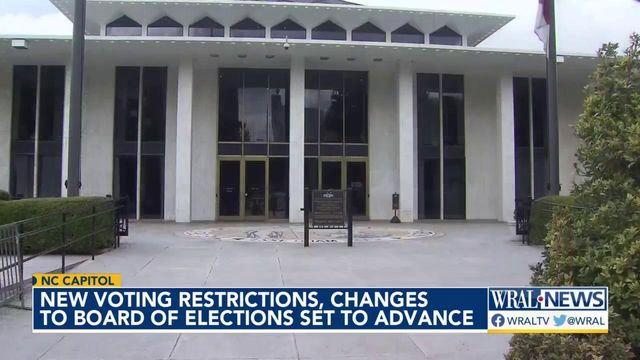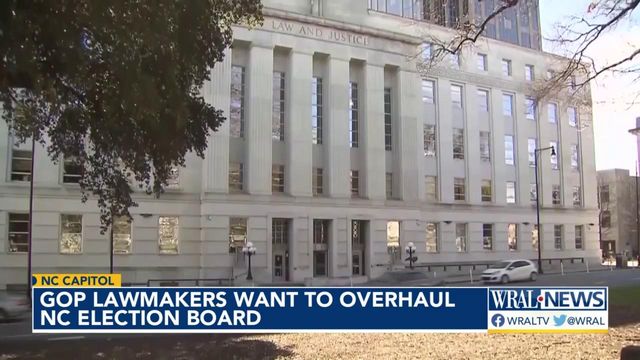Elections overhaul poised to advance in NC legislature amid protests by voting rights advocates
Two new bills aimed at changing North Carolina's rules for voting, and how elections are administered, are expected to quickly advance in the state Senate after an initial debate Wednesday.
It came amid vocal opposition from voting rights advocates and Democratic lawmakers.
One of the Republican-backed bills proposes restrictions on mail-in voting, changes to the rules for same-day voter registration, and a rule to make it easier for people to formally accuse others of voter fraud. It would also require elections boards to acquire and use signature verification software for absentee ballots and to verify signatures for mail-in ballots.
GOP leaders say the changes are needed to improve people's faith in the integrity of elections.
Many voters in North Carolina question the integrity of election results, said Sen. Paul Newton, R-Cabarrus. "That, we cannot have,” he said. “It is up to us as a legislature to take steps to instill confidence in North Carolina voters."
Protesters outside the legislature Wednesday and Democratic lawmakers, however, say the changes are aimed at helping Republicans cement themselves into power.
"What is election integrity after Black and brown voters cast a record number of votes in 2020 in North Carolina, and politicians are now making it more difficult to cast ballots?" said Cassandra Stokes of the North Carolina Black Alliance.
Republican leaders defended the changes in the Senate Redistricting and Elections Committee Wednesday, although they didn't take a vote on the bills. That's expected to occur as soon as Thursday.
One of the bills would eliminate the state's three-day grace period for mail-in ballots to arrive after an election and still be counted, as long as they're postmarked on or before Election Day. Sen. Natasha Marcus, D-Charlotte, said that change will needlessly force elections officials to throw legitimate ballots in the trash, just because of GOP talking points.
In the 2020 elections, nearly 12,000 mail-in ballots came in during the post-election grace period. That was only about 1% of all the mail-in votes that year — and just a small fraction of a percent of the total number of votes cast — but in a close swing state like North Carolina, every fraction of a percent matters.
If those votes hadn't been counted it could very well have affected the results of some high-profile elections: The race for N.C. Supreme Court chief justice that year, for example, was decided by just 400 votes.
Newton defended the proposal to eliminate the grace period, saying that if people want to vote by mail and make sure it's counted, they can just get it in the mail earlier.
"We don't see that as invalidating any votes," he said. "People just need to adjust."
The current grace period for mail-in ballots became law after passing the legislature unanimously in 2009. The push to get rid of it has gained popularity in conservative circles after the 2020 elections — when former Republican President Donald Trump falsely claimed victory on Election Night, before all the votes had been counted.
Tweaking state board
The other elections bill would change the makeup of the state board of elections — which is currently set up so that whichever political party controls the governor's office gets three of five seats on the board — to instead have an evenly split board.
Similar proposals for changing the State Board of Elections have already been shot down in court as unconstitutional in recent years, in addition to being rejected at the ballot box by voters. But GOP leaders are trying again now that the GOP also now controls a majority on the N.C. Supreme Court.
"The reality is, extremists are taking over North Carolina," Rep. Diamond Staton-Williams, D-Cabarrus, said at a press conference Wednesday.
Republicans have pitched the elections board overhaul as a bipartisan solution, although it could give Republican lawmakers control over the minutiae of elections administration.
The bill would change the board to have four Democrats and four Republicans, making tie votes likely. And if there's a tie on questions like who to hire as the state's lead elections administrator, the bill says, the legislature would get to make the final decision.
Newton said it's not a Republican power grab since having a tied board will hopefully encourage bipartisanship.
The Federal Elections Commission is also set up with equal numbers of Democratic and Republican members. But many of the FEC's investigations into foreign influence on elections, or campaign finance violations, have ended with no action because the vote resulted in a tie along party lines.
Bringing a similar system to North Carolina could be good, said Sen. Warren Daniel, R-Burke, when the bill was first introduced Monday. Daniel, who co-chairs the Senate's elections committee, said the possibility for tie votes "would incentive compromise between members, instead of giving members an opening to ram through partisan priorities."
The State Board of Elections is similarly in charge of investigating ethics allegations, campaign finance violations and election fraud complaints. Other changes to state law in recent years have made the existence of state-level campaign finance investigations secret unless they end in charges — as well as making it harder for politicians to be prosecuted for campaign finance violations.











